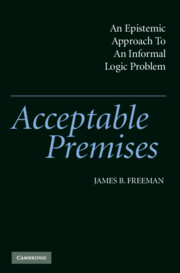Preface
Published online by Cambridge University Press: 02 December 2009
Summary
The project of this book is easily stated. Suppose a proponent puts forward some claim that is in some way doubtful or controversial. The proponent thus incurs a burden of proof. He may attempt to discharge this burden by presenting an argument for his claim. For simplicity's sake, let us assume that he puts forward a one-premise argument. But if that premise in turn is controversial, if by putting it forward the proponent incurs a further burden of proof, he will not have discharged his initial burden unless he discharges this further burden. By attempting to do that, the proponent may incur a further burden of proof because of the premise he puts forward to defend his controversial premise, and so on. Now the opposite of burden of proof is presumption. So if the proponent is proceeding in good faith, he is seeking a premise for which there is a presumption. Given a presumption, his premise should be acceptable. Now any noncircular argument will have basic premises, those not argued for in the course of that argument. So the proponent is seeking ultimately to ground his argument on basic premises for which there is a presumption. When is there a presumption for a premise and how do we recognize it? That is the project of this book, developed over Chapters 1 through 11.
Our conception of the problem of premise adequacy limits our investigation from being even more complex or drawn out.
- Type
- Chapter
- Information
- Acceptable PremisesAn Epistemic Approach to an Informal Logic Problem, pp. ix - xiiPublisher: Cambridge University PressPrint publication year: 2004



